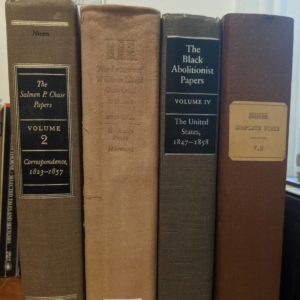For quite a few months now, I have been sharing my experience on PCUR about a project I began last summer on New York City press reporting on a June 1848 workers’ rebellion in Paris, which I am now turning into my second Junior Paper (see my posts here, here, and here). Typing that descriptive phrase of my research indeed feels all too familiar. It seems, however, that this post may be the last time that I repeat it. As of last week, I am changing the focus of my JP: I am now moving on from New York newspapers, and instead examining the broader national antislavery movement’s response to the very same rebellion. Though this seemingly small change is pretty specific to both my discipline and my project, research in any field can benefit from critical examination and reframing.
My switch came at the suggestion of my adviser, who beforehand had encouraged me to look at newspapers beyond New York for the sake of comparison. I returned to him after having looked at two specifically antislavery papers based in Washington and Boston. I shared some pretty exciting (exciting as far as 19th century American history goes, which for me is very exciting) finds, and in response, he told me I had a new, more focused topic. This echoed previous advice he had given me; last year, he guided me to center the more radical newspapers in my project, rather than treating them as merely peripheral. Now, this suggestion came full circle. He rattled off a list of at least ten different antislavery activists I should study, and even hinted that I might need to travel to archives in Rochester and Boston.
At first, I was worried about this change. I was comfortable in an ultra-specific topic I had been working on for a year and a half, and going into my JP research I was using it as a safety blanket of sorts. I was confident in having already completed a lot of research; doing anything else would raise the prospect of even more hours in the archive! That said, as I have been following up on my adviser’s suggestion and digging into a literature with which I am less familiar, I am realizing the value of the change. In retrospect, I felt stuck in my old topic. It seemed stale to mull over it further, and being a project I had begun before even having taken a history course, neither the questions it asked nor the thesis it proposed were as articulate as I wanted them to be for a junior paper. The delimiting of my research to New York was at least a practical matter for greater ease of archive access, and my notes from these archives were woefully disorganized (as I have relayed in this post). In shifting my topic, I have a chance at a fresh start.

Like I said, I am not particularly familiar with much of the existing scholarship related to my new topic, but I see this as a positive: there is an excitement to diving into the new, rather than merely putting the old back together. For example, I am learning how to work with new kinds of sources. My older work was dependent on easy-to-read newsprint, but now I am depending on a lot of handwritten correspondence (some of it housed in Princeton’s own Rare Books and Special Collections). Nineteenth century script is not kind to the eyes, but considering my current career aspirations in professional historical research, I am glad to be getting some manuscript experience.
To be sure, I am not completely in the dark with this new research. I have a solid background from all the work I have done before (otherwise, I do not think my adviser would have thought it wise to change directions), and I do not regret the old research at all. In fact, I would like at least a section of my final JP to incorporate my old work, but it will now be much better contextualized.
This is all to say that changing one’s research focus, especially at the urging of an adviser, can be a reinvigorating process. I also want to emphasize that my change was not a complete one— I might even rephrase, and state that I am not switching my topic so much as I am asking new questions about my old one. With long term projects in any field, constant reexamination is part of the process, and, in my experience, makes it all the more meaningful.
–Alec Israeli, Humanities Correspondent

